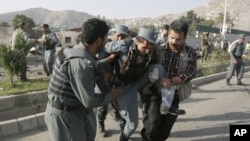Suicide bombers have stormed Britain's cultural center in the Afghan capital, triggering hours of fighting that killed at least eight people, including a NATO soldier.
The Taliban immediately claimed responsibility for Friday's attack, which took place as Afghanistan celebrated the 92nd anniversary of the country's independence from Britain.
The siege of the British Council offices in Kabul began when one of the bombers detonated a car full of explosives outside the main gate, while another suicide bomber struck inside the complex.
Three other militants got inside and engaged in an eight-hour gunfight with Afghan security forces. NATO forces responded, providing support to Afghan police and troops. The attack ended when all the militants were killed.
At least eight people, including Afghan security forces and a coalition soldier, were killed. NATO did not give the nationality of the slain service member. Afghan officials had earlier said nine people were killed. At least 16 people were wounded in the assault.
Three Westerners were inside the British Council offices when Friday's siege began. British officials say the two British nationals and a South African were later rescued by Afghan and international forces.
British Ambassador to Afghanistan William Patey said no British nationals were hurt in the attack. Speaking to reporters, Patey said that what he called a "dastardly, cowardly attack designed to attack British interests" had ultimately ended with the deaths of many Afghans.
Both NATO and Afghan President Hamid Karzai condemned the attack.
The deputy director of the British Council in Kabul, Dawoud Rasoul, told VOA that despite the attack on the council’s compound, its cultural programs for Afghans, especially for young people, would continue. The council assists the Afghan education ministry and also provides scholarships for Afghan youths at British universities.
Britain is the second largest provider of forces to the international coalition in Afghanistan. There are around 9,500 troops British troops in the country, mainly in the south.
Violence in Afghanistan is at its worst since the U.S.-led invasion in late 2001, with international troop and Afghan civilian deaths reaching record levels.
.
DUPLICATE Militants Storm British Council in Afghan Capital in Deadly Attack




